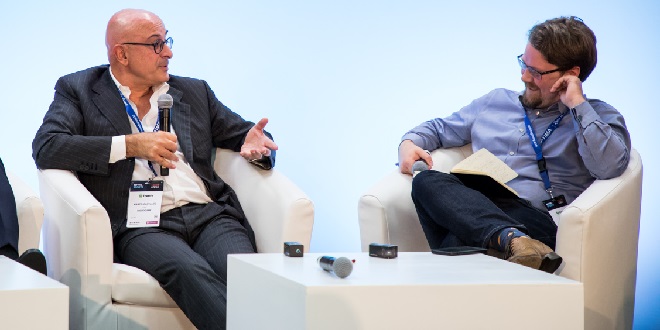The more that Italian sports betting and gaming operators embrace the omnichannel concept, the less they will miss traditional media advertising.
That’s according to Marco Castaldo, CEO at Microgame (pictured left), who believes most of the money pre-advertising ban last summer was “spent ineffectively anyway”.
We are looking ahead to next month’s SBC Summit Barcelona – Digital, where Castaldo is headlining a panel on the importance of the omnichannel experience – something he thinks should be viewed by operators as a “twin remedy” for the advertising ban, leading to both increased customer acquisition and a greater level of retention.
Microgame has come to appreciate the advantages of the omnichannel (or multichannel) approach, which include variable acquisition costs and access to a broader segment of ‘mass market’ players with lower average revenue per user (ARPU) but greater loyalty.
Castaldo added that requests for Microgame services have been higher than ever since the coronavirus outbreak effectively shut down the retail sector, largely because what he calls the “land-based die hards” – or those who have historically viewed online as a competing channel – have been forced to get on the online bandwagon.
“Needless to say, retailers with elements of a multichannel strategy have fared much better than those without in recent months,” he said. “But there is still an established cultural and organisational mindset holding many of these traditionalists back from the true value of the omnichannel experience.”
He did, however, recognise that there are roadblocks to such an approach in Italy, where regulation dictates that an online wallet cannot be used offline, but instead highlighted two retail strategies which Microgame is using to diversify revenues for its clients.
The first of these is what Castaldo refers to as land-based affiliation, which is where players are recruited and receive certain services (like account deposits and withdrawals) through a network of retail outlets such as bars, tobacco shops or newspaper kiosks.
He explained: “The many advantages to this setup include personal contact with potential players and greater access to the recreational or non price sensitive segment, as well as reduced competition compared with the online world where in most cases several competing operators are featured and the player can be subjected to a bonus war.”
Castaldo admits that the focus on land-based affiliates requires investment by the operator in the supporting architecture, but stressed that the Microgame platform – already housing thousands of such affiliates – includes a sophisticated multi-level commission engine which allows operators to implement tailored distribution strategies aligned with their objectives.
“The platform generates automated invoicing and clearing for commissions, guaranteeing timely and precise administration with minimum effort for the operators. It’s these details that make the difference on the back end.
“On the front-end, it’s important to have an offer that’s tailored to the segment and we have specialised in this over the years. Choosing the right mix of slot RTPs and volatilities for ‘retail-sourced’ players is important. We have designed a suggestion engine which tailors the experience at the level of the individual players; ultimately this is the way to allow our customers to serve different player segments maintaining relevance.
“Our platform is also designed to allow the operator to operate different brands with separate bookmaking profiles, so we can accommodate different distribution strategies that require presentation of less aggressive odds to players sourced in retail vs what the operator offers to more price-sensitive online-sourced customers.”
The second strategy is to sync the player experience between the two places where the betting actually occurs, namely the online site or licensed offline venue. It uses the logic of continuity between different moments of the player’s journey – both physical and virtual.
“We have integrated our online and shop platforms to allow our customers to provide various elements of a seamless experience from ‘mobile to shop’ and back again, both in terms of play action as well as in communications and promotions,” Castaldo explained.
Despite the hype around the concept, execution of the omnichannel experience – for all but a few operators – remains at an infant stage. For Microgame, it’s where the future lies.
To register for SBC Summit Barcelona – Digital, click HERE. Marco Castaldo will be joined on the omnichannel panel by experts including Nicklas Zajdel, Group COO at Fortuna Entertainment Group, and Arno de Jong, CMO at Nederlandse Loterij.









